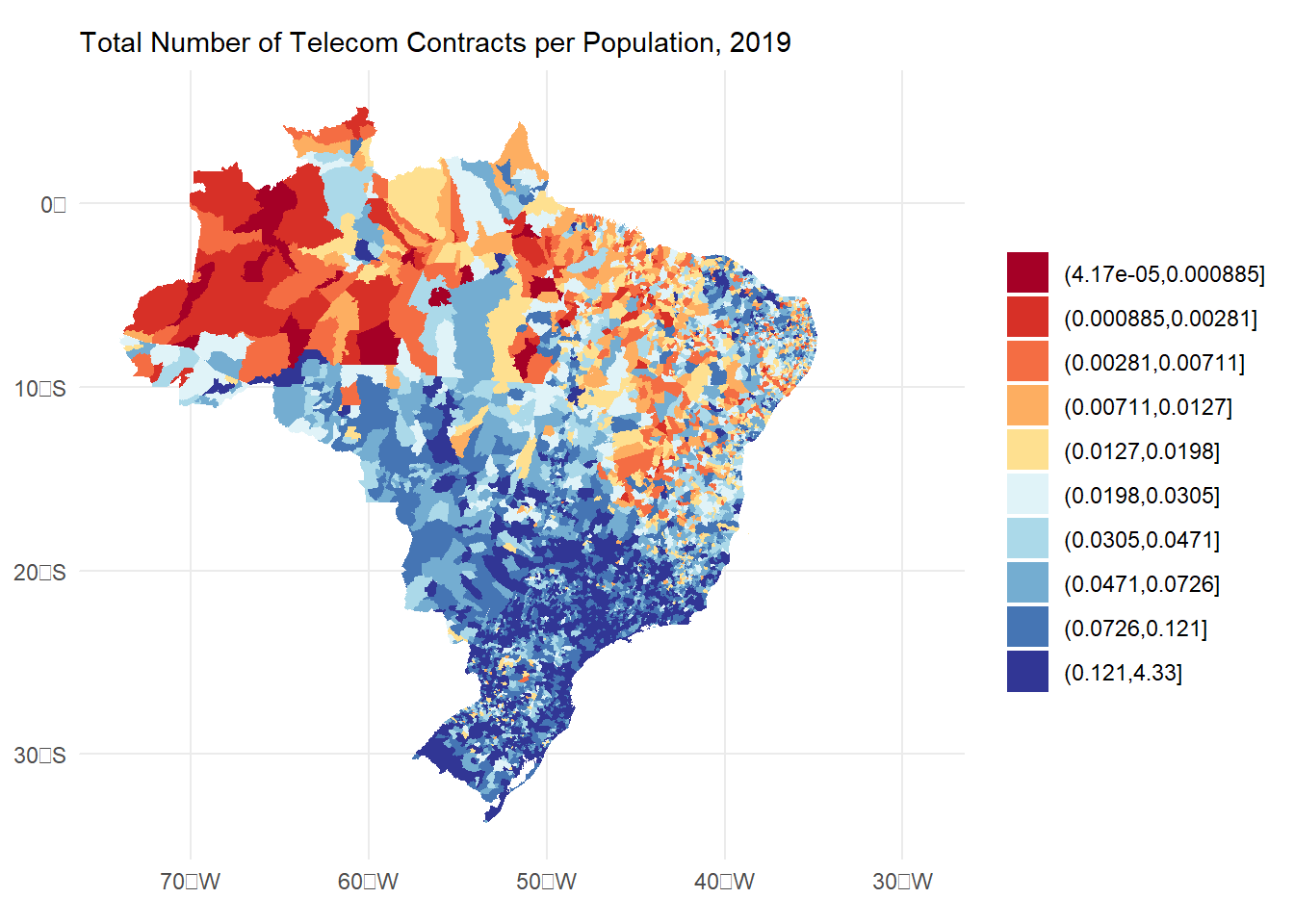Code
microdata_outputThe population data is constructed using IBGE’s yearly municipal population estimates. We download and manually pre-process the data into one consolidated excel file: /input/population/population_BR_municipio_year.xlsx. We impute 2010 my averaging 2009 and 2011 population figures per municipality. We re-create the 7-digit municipality identifier by combining 2-digit UF and five-digit municipality codes; adding leading zeroes to the five-digit codes wherever necessary. We merge telecommunications and population data by year and (7-digit) municipio codes.
pop The telecommunications data was collected from an Anatel API which grants access to open telecommunications data at the year-month-municipality-provider-transmission-technology-speed level. The data indicates the number of accesses for each group. Table (telecoms_data_sample?) depicts an example of the clean source data. Table (year_month_mun?) is the collapsed data-set at the year-month-municipality level.
microdata_sampleClean ANATEL Micro-data
microdata_output#
# muni <- read_municipality()
#
# plotting_microdata_output <- microdata_output %>% copy() %>% .[year==2007] %>% .[month==12] %>%
# dplyr::left_join(muni, ., by = c("code_muni" = "municipio"))
#
# breaks_qt <- classIntervals(c(min(plotting_microdata_output$total_accesses_per_pop) - .0000001, plotting_microdata_output$total_accesses_per_pop), n = 10, style = "quantile")
#
# plotting_microdata_output <- mutate(plotting_microdata_output, total_accesses_per_pop_cat = cut(total_accesses_per_pop, breaks_qt$brks))
plotting_microdata_output %>% .[which(plotting_microdata_output$year==2007), ] %>%
ggplot(data=.) +
geom_sf(aes(fill=total_accesses_per_pop_cat), color= NA, size=.15) +
labs(subtitle="Total Number of Telecom Contracts per Population, 2007", size=8) +
scale_fill_brewer(palette = "RdYlBu") +
# scale_fill_distiller(palette = "Blues", name="Ratio") +
theme_minimal() +
theme(legend.title = element_blank())
Total Number of Telecom Contracts per Population (2007, December)
plotting_microdata_output %>% .[which(plotting_microdata_output$year==2012), ] %>%
ggplot(data=.) +
geom_sf(aes(fill=total_accesses_per_pop_cat), color= NA, size=.15) +
labs(subtitle="Total Number of Telecom Contracts per Population, 2012", size=8) +
scale_fill_brewer(palette = "RdYlBu") +
# scale_fill_distiller(palette = "Blues", name="Ratio") +
theme_minimal() +
theme(legend.title = element_blank())
Total Number of Telecom Contracts per Population (2012, December)
# muni <- read_municipality()
#
# plotting_microdata_output <- microdata_output %>% copy() %>% .[year==2019] %>% .[month==12] %>%
# dplyr::left_join(muni, ., by = c("code_muni" = "municipio"))
#
# breaks_qt <- classIntervals(c(min(plotting_microdata_output$total_accesses_per_pop) - .0000001, plotting_microdata_output$total_accesses_per_pop), n = 10, style = "quantile")
#
# plotting_microdata_output <- mutate(plotting_microdata_output, total_accesses_per_pop_cat = cut(total_accesses_per_pop, breaks_qt$brks))
plotting_microdata_output %>% .[which(plotting_microdata_output$year==2019), ] %>%
ggplot(data=.) +
geom_sf(aes(fill=total_accesses_per_pop_cat), color= NA, size=.15) +
labs(subtitle="Total Number of Telecom Contracts per Population, 2019", size=8) +
scale_fill_brewer(palette = "RdYlBu") +
# scale_fill_distiller(palette = "Blues", name="Ratio") +
theme_minimal() +
theme(legend.title = element_blank())
Total Number of Telecom Contracts per Population (2019, December)
We aggregate accross provider, transmission, technology and speed. The following histograms depict the number of observations in the full data broken down by each of these categories.
microdata_year %>%
.[order(year)] Observations per year
microdata_provider %>%
.[, sum(N), provider_name] %>%
.[order(-V1)] %>%
rename(., Accesses = V1 )Number of accesses per provider for the full panel
microdata_tech_gen %>%
.[, sum(N), .(technology, generation)] %>%
.[order(-V1)] %>%
rename(., Accesses = V1 )Number of accesses per technology for the full panel
microdata_tech_gen %>%
.[, sum(N), generation] %>%
.[order(-V1)] %>%
rename(., Accesses = V1 )Number of accesses per generation for the full panel
microdata_transmission %>%
.[, sum(N), transmission] %>%
.[order(-V1)] %>%
rename(., Accesses = V1 )Number of accesses per transmission type for the full panel
microdata_speed %>%
.[, sum(N), speed] %>%
.[order(-V1)] %>%
rename(., Accesses = V1 ) Number of accesses per speed type for the full panel